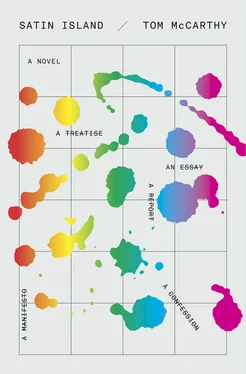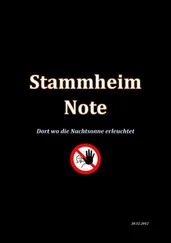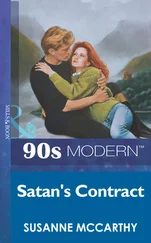4.2Also ironic: the very first brief I was given when I started working at the Company. I was, Tapio informed me, to compile a dossier on jeans. The client was Levi’s — or, to give the company its full name, Levi Strauss. A little research unearthed more than just coincidence behind the nomenclatural overlap: the jean-maker, like the anthropologist, had been an Ashkenazi Jew; both, leaving Europe under vague or not-so-vague threat, had turned to the Americas, and built their fame on what they did there. Levi-no-hyphen-Strauss was German; but the fabric he sold came, like Lévi-Strauss, from France — from Nîmes, down in the South. Serge de Nîmes: denim. Nîmes serge has unique fading and dyeing properties. I spent my first three weeks of gainful employment interviewing teenagers, mid-life-crisis-riven men and garment workers; assessing the subtle code-spectrum of turn-ups, buttons, zippers, creases; generally breaking down how jeans, and Levi Strauss ones in particular, connoted. I got really into creases. Jeans crease in all kinds of interesting ways: honeycomb, whisker, train-track, stack … I catalogued no fewer than seventeen different crease-types, each of which has slightly different innuendos. To frame these — that is, to provide a framework for explaining to the client what these crease-types truly and profoundly meant —I stole a concept from the French philosopher Deleuze: for him le pli , or fold, describes the way we swallow the exterior world, invert it and then flip it back outwards again, and, in so doing, form our own identity. I took out all the revolutionary shit (Deleuze was a leftie); and I didn’t credit Deleuze, either. Big retail companies don’t want to hear about such characters. I did the same thing with another French philosopher, Badiou: I recycled his notion of a rip , a sudden temporal rupture, and applied it, naturally, to tears worn in jeans, which I presented as the birth-scars of their wearer’s singularity, testaments to the individual’s break with general history, to the successful institution of a personal time. I dropped the radical baggage from that, too (Badiou is virtually Maoist). This pretty much set up the protocol or MO I’d deploy in my work for the Company from then on in: feeding vanguard theory, almost always from the left side of the spectrum, back into the corporate machine. The machine could swallow everything, incorporate it seamlessly, like a giant loom that reweaves all fabric, no matter how recalcitrant and jarring its raw form, into what my hero would have called a master-pattern — or, if not that, then maybe just the pattern of the master.
4.3 Le pli . While my supposed business, my “official” function, as a corporate ethnographer, was to garner meaning from all types of situation — to extract it, like a physicist distilling some pure, unadulterated essence out of common-mongrel compounds, or a miner drawing gold ore from deep within the earth’s bowels — I sometimes allowed myself to think that, in fact, things were precisely the other way round: that my job was to put meaning in the world, not take it from it. Divining, for the benefit of a breakfast-cereal manufacturer, the social or symbolic role of breakfast (what fasting represents, the significance of breaking it); establishing for them some of the primary axes shaping the way in which the practice of living is, or might be, carried out; and watching the manufacturer then feed that information back into their product and its packaging as they upgraded and refined these, I understood the end-result to be not simply better-tasting cereal or bigger profits for the manufacturer, but rather meaning , amplified and sharpened, for the millions of risers lifting cereal boxes over breakfast tables, tipping out and ingesting their contents. Helping a city council who were thinking of creating parks and plazas but had yet to understand the ethnographic logic driving such an act; laying out for them the history of public (as opposed to private) space, making them grasp what these zones fundamentally embody, what’s at play in them from a political and structural and sacred point of view; and doing this in such a way that this whole history is then injected back into the squares, sports-fields and playgrounds millions of citizens will then inhabit — same thing. Down in my office, stirred and lulled by ventilation, I would picture myself as some kind of nocturnal worker, like those men who go out and repair the roads, or check the points and switches on the railway tracks, or carry out a range of covert tasks that go unnoticed by the populace-at-large, but on which the latter’s well-being, even survival, is dependent. While the city sleeps, bakers are baking bread in night-kitchens, milkmen are loading crates onto their floats; and river-men are dredging riverbeds or checking water-levels, while other men in buildings with nondescript exteriors track storm surges and spring- and neap-tides on their screens, and activate the flood defences when this becomes necessary. When the populace-at-large wakes up, they just see the milk there on their doorstep, and the fresh bread in the shop down the street, and the street itself still there, unflooded, un-tsunamied from existence; and they take it all for granted, where in fact these men have put the milk and bread there, and have even, in deploying the flood defences, put the city there as well, put it back there every time they deploy them. That’s what I was doing, too, I told myself. The world functioned, each day, because I’d put meaning back into it the day before. You didn’t notice that I put it there because it was there; but if I’d stopped, you’d soon have known it.
4.4I compiled a lot of dossiers. They weren’t always for clients. The Company gave me carte blanche to follow my own nose when not working on a specific brief. I went to conferences, read (and, occasionally, wrote) articles, kept my finger on the soft pulse of the media — and compiled dossiers. I had a dossier on Japanese game-avatars, and another one on newspaper obituaries; a dossier on post-match interviews with sportsmen and their managers; a dossier on alleged alien sightings and one on shark attacks; dossiers on tattoos, “personalization” trends for hand-held gadgets, the rhetoric and diction of scam emails. These dossiers sprang up spontaneously, serendipitously, whimsically. A situation, a recurring meme would catch my eye, pique my fancy, and I’d start investigating it: following its spore, seeing where it led, collecting instances of its occurrence, assembling an inventory of all its guises and mutations; like a detective keeping a file on a quarry that’s both colourful and slippery, elusive — a cat-burglar, say, or quick-change-artist con-man.
4.5When I write “dossier,” this might imply some kind of tidy, reasoned set of entries, each held in its own box-file. But the process was much less orderly: my dossiers largely consisted of scraps of paper stuck around my walls, with lines connecting them and annotations, legible only to me, scrawled at their margins. Each one would stay up for a while, then be replaced by the next one. As the scraps of paper came down, I would stuff them, usually unsorted, into large portfolios. Only the ones for clients ended up as neat, legible documents — although whether the personal whimsy-dossiers were actually so separate from the client-ones is another question. Who’s to say what is, or might turn out to be, related to what else? Occasionally, a whimsy-dossier would suddenly and without warning overlap with a client-one, or with a previous whimsy- or client-one, or several of both, in quite unexpected and surprising ways, parities and conjunctions appearing between contexts that, on the surface of things, seemed to have nothing in common. When this happened, I’d feel a sudden pang, a bristling in the back of my neck: the stirring, the re-animation, of a fantasy that, like in hard-boiled novels and noir movies, all the various files would one day turn out to have been related all along, their sudden merging leading me to crack the case. What was “the case”? I didn’t know — but that was the whole point: the answer to that would become clear once all the dossiers hove into alignment.
Читать дальше












